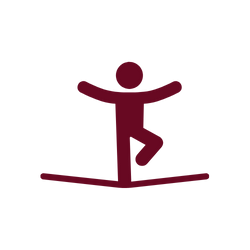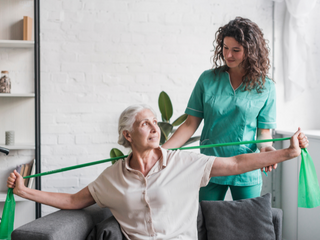The Falls Prevention Study
A strategy designed to help older adults continue with the Otago Exercise Program.

Problem
One in five older adults (age 65+) living in the community fall every year and 10-15 per cent of these falls result in injuries that require emergency department visits. Six per cent lead to hospital admissions. About 40-50 per cent of older adults with osteoarthritis are physically frail, which increases the risk of falls.

One Solution
The Otago Exercise Program was developed by a group of researchers at the University of Otago in the 1990s and consists of strength and balance training delivered by a physiotherapist. There is strong evidence that it can reduce falls in older adults, but only 25 per cent of people who start the program, continue with it over time.

Falls Prevention Study
We’re developing and testing a new strategy for physiotherapists to better support older adults to continue with the Otago Exercise Program over time. This includes counselling techniques, as well as the use of an app so participants can record and easily share their progress with their therapists.
About Otago
Strength & Balance Exercises
Tailored to older adults (done 3x per week)

Short Walks
Done 2x per week

Home Visits
With a physiotherapist (4-5 visits)

Phone Calls
Conducted between home visits

“It has been shown with evidence over the last 20 years that the Otago Exercise Program can help reduce the risk of falls. One of the studies done in British Columbia showed that exercise programs can reduce falls by over 50 per cent in older adults who are frail and have fallen in the past.”
Goal
Improve muscle strength and balance

Research to Stop Falls
Physical activity is the most promising strategy to help older adults prevent falls. With the number of people in Canada, aged 65+, expected to grow to 10.4 million by 2037, stopping falls that cause serious injuries will become increasingly important.
“We know that the Otago Exercise Program works, but only if people do it,” said Dr. Linda Li, Senior Scientist at Arthritis Research Canada and Principal Investigator on the Falls Prevention Study.
Our research is all about developing a strategy to help older adults continue with the Otago Exercise Program over time so they can receive all of its benefits.
“A lot of older adults who start the Otago Exercise Program, for one reason or another, are not able to continue with the prescribed exercises, so we’re testing a strategy to support physiotherapists in helping older adults to set goals and develop a plan that’s realistic for them.”
Research Scientist

Dr. Linda Li, BSc(PT), MSc, PhD, FCAHS
Senior Scientist, Arthritis Research Canada
Dr. Linda Li is a Professor in the Department of Physical Therapy at the University of British Columbia. In 2006, she was the first rehabilitation professional appointed as Harold Robinson Chair in Arthritic Diseases. She is also the Canada Research Chair in Patient-oriented Knowledge Translation.
Dr. Li completed her Bachelor of Science in Physiotherapy at McGill University and Master’s of Science at the University of Western Ontario. She earned a Doctorate in Clinical Epidemiology at the University of Toronto in 2004. Two years later, she completed a CIHR-funded, Post-doctoral Fellowship in knowledge translation at the Ottawa Hospital Research Institute.
Dr. Li’s research and academic activities focus in two areas: models of care in the management of arthritis, and the development and evaluation of knowledge translation strategies. Her research centres on assessing health service delivery models, and understanding and facilitating the use of evidence by health professionals and patients. Areas of methodological expertise include clinical epidemiology, knowledge translation, clinical trials, and survey design.

















































